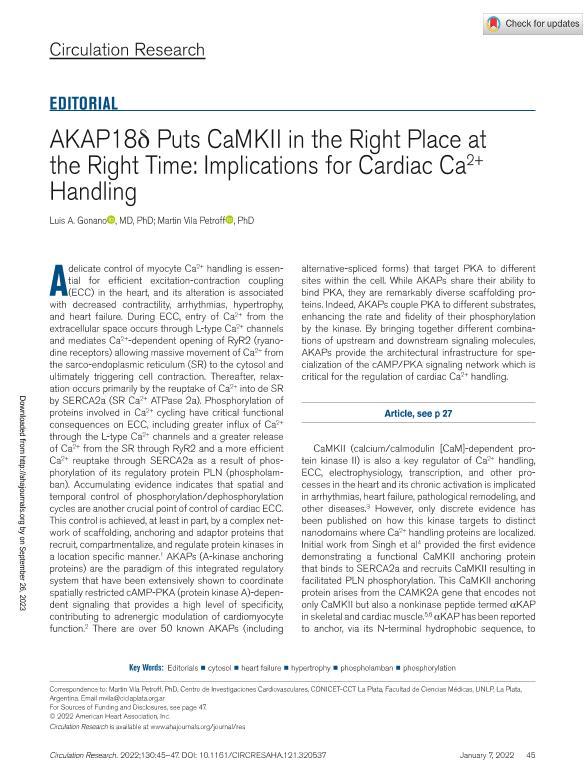Mostrar el registro sencillo del ítem
dc.contributor.author
Gonano, Luis Alberto

dc.contributor.author
Vila Petroff, Martin Gerarde

dc.date.available
2023-09-26T16:18:41Z
dc.date.issued
2022-01
dc.identifier.citation
Gonano, Luis Alberto; Vila Petroff, Martin Gerarde; AKAP18δ Puts CaMKII in the Right Place at the Right Time: Implications for Cardiac Ca 2+ Handling; Lippincott Williams; Circulation Research; 130; 1; 1-2022; 45-47
dc.identifier.issn
0009-7330
dc.identifier.uri
http://hdl.handle.net/11336/213106
dc.description.abstract
A delicate control of myocyte Ca2+ handling is essential for efficient excitation-contraction coupling (ECC) in the heart, and its alteration is associated with decreased contractility, arrhythmias, hypertrophy, and heart failure. During ECC, entry of Ca2+ from the extracellular space occurs through L-type Ca2+ channels and mediates Ca2+-dependent opening of RyR2 (ryanodine receptors) allowing massive movement of Ca2+ from the sarco-endoplasmic reticulum (SR) to the cytosol and ultimately triggering cell contraction. Thereafter, relaxation occurs primarily by the reuptake of Ca2+ into de SR by SERCA2a (SR Ca2+ ATPase 2a). Phosphorylation of proteins involved in Ca2+ cycling have critical functional consequences on ECC, including greater influx of Ca2+ through the L-type Ca2+ channels and a greater release of Ca2+ from the SR through RyR2 and a more efficient Ca2+ reuptake through SERCA2a as a result of phosphorylation of its regulatory protein PLN (phospholamban). Accumulating evidence indicates that spatial and temporal control of phosphorylation/dephosphorylation cycles are another crucial point of control of cardiac ECC. This control is achieved, at least in part, by a complex network of scaffolding, anchoring and adaptor proteins that recruit, compartmentalize, and regulate protein kinases in a location specific manner.1 AKAPs (A-kinase anchoring proteins) are the paradigm of this integrated regulatory system that have been extensively shown to coordinate spatially restricted cAMP-PKA (protein kinase A)-dependent signaling that provides a high level of specificity, contributing to adrenergic modulation of cardiomyocyte function.2 There are over 50 known AKAPs (including alternative-spliced forms) that target PKA to different sites within the cell. While AKAPs share their ability to bind PKA, they are remarkably diverse scaffolding proteins. Indeed, AKAPs couple PKA to different substrates, enhancing the rate and fidelity of their phosphorylation by the kinase. By bringing together different combinations of upstream and downstream signaling molecules, AKAPs provide the architectural infrastructure for specialization of the cAMP/PKA signaling network which is critical for the regulation of cardiac Ca2+ handling.
dc.format
application/pdf
dc.language.iso
eng
dc.publisher
Lippincott Williams

dc.rights
info:eu-repo/semantics/openAccess
dc.rights.uri
https://creativecommons.org/licenses/by-nc-sa/2.5/ar/
dc.subject
CYTOSOL
dc.subject
EDITORIALS
dc.subject
HEART FAILURE
dc.subject
HYPERTROPHY
dc.subject
PHOSPHOLAMBAN
dc.subject
PHOSPHORYLATION
dc.subject.classification
Fisiología

dc.subject.classification
Medicina Básica

dc.subject.classification
CIENCIAS MÉDICAS Y DE LA SALUD

dc.title
AKAP18δ Puts CaMKII in the Right Place at the Right Time: Implications for Cardiac Ca 2+ Handling
dc.type
info:eu-repo/semantics/article
dc.type
info:ar-repo/semantics/artículo
dc.type
info:eu-repo/semantics/publishedVersion
dc.date.updated
2023-07-06T21:55:41Z
dc.journal.volume
130
dc.journal.number
1
dc.journal.pagination
45-47
dc.journal.pais
Estados Unidos

dc.journal.ciudad
Philadelphia
dc.description.fil
Fil: Gonano, Luis Alberto. Consejo Nacional de Investigaciones Científicas y Técnicas. Centro Científico Tecnológico Conicet - La Plata. Centro de Investigaciones Cardiovasculares "Dr. Horacio Eugenio Cingolani". Universidad Nacional de La Plata. Facultad de Ciencias Médicas. Centro de Investigaciones Cardiovasculares "Dr. Horacio Eugenio Cingolani"; Argentina
dc.description.fil
Fil: Vila Petroff, Martin Gerarde. Consejo Nacional de Investigaciones Científicas y Técnicas. Centro Científico Tecnológico Conicet - La Plata. Centro de Investigaciones Cardiovasculares "Dr. Horacio Eugenio Cingolani". Universidad Nacional de La Plata. Facultad de Ciencias Médicas. Centro de Investigaciones Cardiovasculares "Dr. Horacio Eugenio Cingolani"; Argentina
dc.journal.title
Circulation Research

dc.relation.alternativeid
info:eu-repo/semantics/altIdentifier/url/https://www.ahajournals.org/doi/10.1161/CIRCRESAHA.121.320537
dc.relation.alternativeid
info:eu-repo/semantics/altIdentifier/doi/http://dx.doi.org/10.1161/CIRCRESAHA.121.320537
Archivos asociados
